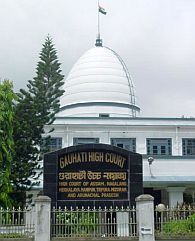 In a curious judgement, the Gauhati high court has struck down the resolution through which the Central Bureau Investigation was set up and held all its actions as "unconstitutional".
In a curious judgement, the Gauhati high court has struck down the resolution through which the Central Bureau Investigation was set up and held all its actions as "unconstitutional".
The judgement by the division bench, comprising justices I A Ansari and Indira Shah, came on a writ petition filed by one Navendra Kumar challenging an order by a single judge of the High Court in 2007 on the resolution through which CBI was set up.
"We hereby...set aside and quash the impugned Resolution, dated 01.04.1963, whereby CBI has been constituted... We do hold that the CBI is neither an organ nor a part of the Delhi Special Police Establishment (DSPE) and the CBI cannot be treated as a 'police force' constituted under the DSPE Act, 1946," the court said.
It further said the aforementioned Home Ministry resolution was "not the decision of the Union Cabinet nor were these executive instructions assented to by the President".
"Therefore, the impugned Resolution...can, at best, be regarded as departmental instructions, which cannot be termed as 'law'," the judgement said.
The court then set aside and quashed the charge-sheet, submitted by CBI, against Kumar, along with the trial.
Further, the court said "the actions of the CBI, in registering a case, arresting a person as an offender, conducting search and seizure, prosecuting an accused etc. offend Article 21 of the Constitution and are, therefore, liable to be struck down as unconstitutional."
The court, however, said quashing of the proceedings that are pending in the CBI court would not be a bar to any further investigation by police having jurisdiction over the subject-matter.
On the setting up of the CBI, the court said the investigating agency was constituted as an ad hoc measure to deal with certain exigencies.
"This measure, taken by the Union Government, was not in the form of any Ordinance; rather, constitution of the CBI was an executive decision and that too, without citing, or referring to, the source of power," it added.
The judges said the Resolution does not refer to any provisions of the DSPE Act, 1946, as the source of CBI's power.
"We have, therefore, no hesitation in concluding that CBI is not established under the DSPE Act, 1946, or is an organ of the Delhi Special Police Establishment," they added.
The court also maintained there is nothing either in the DSPE Act or in the Resolution to show that the CBI is a creation of a delegated piece of legislation.
"The name of the establishment, created by the DSPE Act, 1946, is Delhi Special Police Establishment and not CBI; whereas it is the impugned Resolution which has created the CBI as a police force for investigation of offences preparatory to filing of charge-sheets," it added.
Stating that giving a new name to an organisation is not permissible by any executive instruction, the court said only Delhi Special Police Establishment can be termed as a statutory body created by the DSPE Act and not the CBI.
The judges also said they had ordered the respondents to produce the records relating to creation of the CBI but they did not file the original records and produced a certified copy received from the National Archives.
"However, even perusal of the entire records makes it clear that the Resolution was neither produced before the President of India nor did it ever receive the assent of the President of India. Hence, strictly speaking, the Resolution, in question, cannot even be termed as the decision of the Government of India," they added.
The bench said the Union home ministry was working on the assumption that there is already provision in the Constitution for creation of the CBI
The court also criticised the Centre's way of working while strengthening the muscles of CBI.
"It is strange, as discernible from the notings... that the central government did not want the states to know its intention of expanding the scope of the Bureau in due time," it added.











 © 2025
© 2025